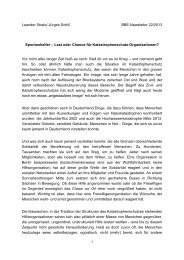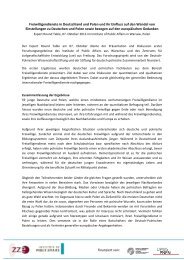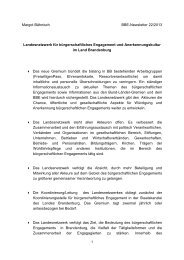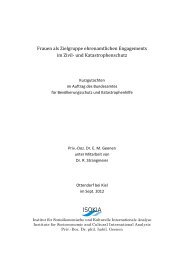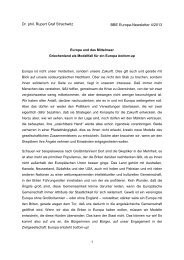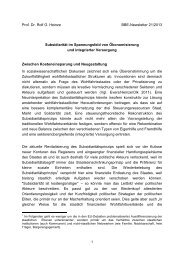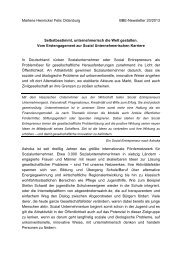ENGAGEMENT UND ERWERBSARBEIT IN EUROPA - BBE
ENGAGEMENT UND ERWERBSARBEIT IN EUROPA - BBE
ENGAGEMENT UND ERWERBSARBEIT IN EUROPA - BBE
Sie wollen auch ein ePaper? Erhöhen Sie die Reichweite Ihrer Titel.
YUMPU macht aus Druck-PDFs automatisch weboptimierte ePaper, die Google liebt.
euter: Volunteering and employment<br />
QualificatiOns and skills = eMplOyability?<br />
It is a known fact that every couple of years, a few<br />
new buzzwords find their way into our vocabulary.<br />
Prime examples are ‚employability‘ or ‚flexicurity‘.<br />
Do skills and qualifications acquired through voluntary<br />
work increase or improve the volunteers‘<br />
‚employability‘, or their entry into the job market?<br />
Should we even consider looking at volunteering<br />
from this perspective?<br />
In actual fact, any form of voluntary work should always<br />
be a relevant additional argument for employing<br />
someone these days; however, the skills and qualifications<br />
acquired at school or university, or through<br />
vocational qualifications or professional experience<br />
and further education must remain the main criteria.<br />
In my opinion, volunteering is no substitute for these;<br />
it can, however, be a useful addition.<br />
Suggestions that the co-operation between the departments<br />
for employment and volunteering associations<br />
should be improved have entered the debate<br />
at the European level. At best, I consider this<br />
as ambivalent, not least because it bears the risk of<br />
confusion with regard to responsibilities and scope.<br />
Departments of employment are plainly tasked with<br />
finding decent jobs for job seekers. Volunteering associations<br />
are tasked with assisting in encouraging<br />
and managing of civic engagement, which must not<br />
become an alternative to paid employment.<br />
Also under debate is the issue of how and whether a<br />
value can be placed on this engagement, i.e. how much<br />
is it worth. Not in terms of intangible values, but in<br />
terms of money, and again, there is some ambivalence.<br />
ciVic engageMent and sOcial inclusiOn<br />
Volunteering obviously plays a vital role in the promotion<br />
of integration and the fight against social exclusion,<br />
on the one hand through the direct involvement<br />
of the excluded or those threatened by social<br />
exclusion; a not inconsiderable 120 million people<br />
in the European Union, according to the EU. On the<br />
other hand, this kind of active involvement can raise<br />
the self-esteem of people living at the edge of society<br />
and give them the feeling of doing something<br />
useful for the community.<br />
Volunteering can pave the way back into society for<br />
these citizens, assuming it is suitably supervised.<br />
40<br />
suMMary<br />
To conclude I would like to state the following:<br />
• Civic engagement plays a central role in our society<br />
and reflects European values.<br />
• There must be a clear line between civic engagement<br />
and paid or gainful employment. Volunteering<br />
must not be allowed to undermine<br />
existing employment contracts or endanger<br />
jobs. This was recently confirmed at a meeting<br />
of the European Council for Employment, Social<br />
Policy, Health and Consumer Affairs (EPSCO) in<br />
Luxembourg.<br />
• Civic engagement improves personal skills and<br />
qualifications and represents social and labour<br />
market relevant capital.<br />
• The recognition of non-formal and official education<br />
through voluntary work should become<br />
a European and national cause, and civic society<br />
stakeholders should be involved in the conception<br />
and shaping of the relevant political<br />
processes.



